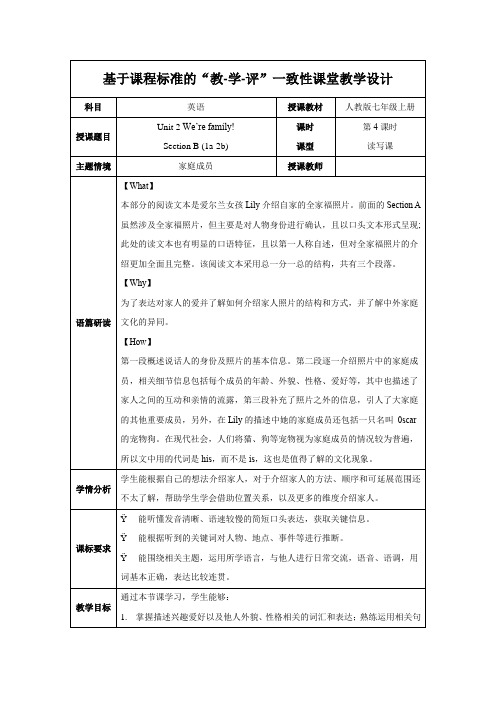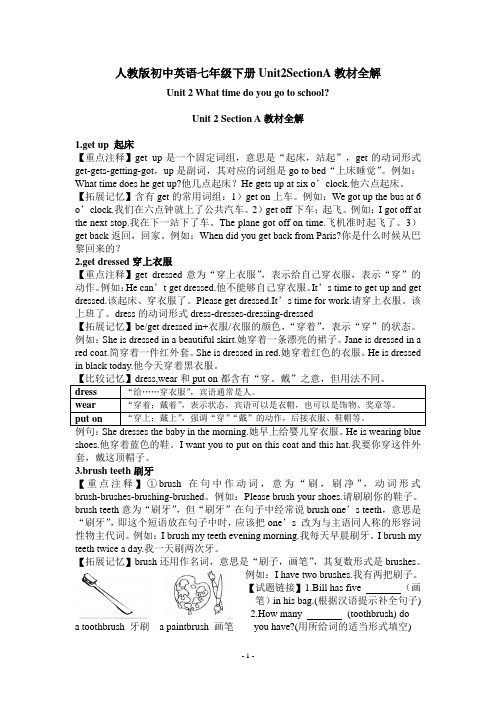人教版初中英语七年级下册Unit2SectionB教材全解
- 格式:doc
- 大小:59.50 KB
- 文档页数:9



人教版初中英语七年级下册Unit1SectionB教材全解Unit 1 Can you play the guitar?Unit 1 Section B教材全解1.Hello,I’m Peter.I like to play basketball.I can speak English and I can also play soccer.你好!我是彼特。
我喜欢打篮球。
我会说英语,也会踢足球。
【重点注释】①I like to play basketball.我喜欢打篮球。
like doing sth.和like to do sth.都表示“喜欢做某事”,但动名词所表示的动作,在意义上比较一般和抽象,时间观念不强,不指某一次动作;动词不定式则常指某个具体的一次性的动作。
例如:She likes swimming.她喜欢游泳(经常性的爱好)。
She likes to swim this afternoon.她今天下午想游泳(特指某一次的动作)。
另外,在搭配(使用方法)上,还有一点区别:(1)“like to do sth.”一般与“would”搭配,构成would like (would like 后面只能跟动词不定式,即woule like to do sth.),表示“意愿”。
例如:I would like to swim with you .我愿意和你去游泳。
Would you like to skate? 你愿意去滑冰吗?Would you like to have some bananas?你想吃些香蕉吗?(2)“like doing sth.”表示“爱好”。
例如:I like watching TV.我喜欢看电视。
Do you like singing ?你喜欢唱歌吗?②I can speak English and I can also play soccer.我会说英语,也会踢足球。


人教版英语七年级下册教课设计: Unit2 What time do you go to ? SectionB( 3a-Self Check)教课设计Unit2 SectionB ( 3a-Self Check)教课设计1.0 Teaching analysis 教情解析1.1 Teaching objectives 教课目的1.1.1 Language goals 语言目标1.1.1.1 Key Words and Chunks1.1.1.1.1 For applying: life1.1.1.1.2 For comprehending:1.1.1.2 Sentence Structures1)I usually exercise from six fifteen to seven.2)I have a very healthy life.3)You need to brush your teeth after eating to have good teeth.4)I don’ t have time to cleanmy room from Monday to Friday. So I clean iton weekends.5)Because she always makes breakfast for me.6)I don ’ t know. But ishenever late for the first class in the morning.1.1.1.3 Grammar Focus1)You need to brush your teeth after eating to have good teeth. (need在句中作实意动词,意为“需要”,构造为 need to do sth; after 在句中作介词,意为“在 ...后”,后接动词要用 -ing 形式 )2) Because she always makes breakfast for me. (make在句中作动词,意为“做饭” , 为谁做饭用 for )1.1.2 Ability goals能力目标1.1.2.1 指引学生全面阅读性复习,总结概括全部学过的相关平时生活及作息习惯的词汇和语言构造。




Unit2 SectionB(1a-1e)名师教案1.0Teaching analysis教情分析1.1Teaching objectives 教学目标1.1.1Language goals 语言目标1.1.1.1 Key Words and Chunks1.1.1.1.1 For applying: half,past, quarter, homework, run, clean, walk, do(one’s) homework, take a walk,1.1.1.1.2 For comprehending:1.1.1.1.3 Sentence Structures1)When do students usually eat dinner?2)They usually eat dinner at a quarter to seven in the evening.3)I want to know about your day.4)I do my homework at about five.5)When do you get up? Usually at about half past five, then I run at six o’clock.1.1.1.1.4Grammar Focus1)When do students usually eat dinner? (when用于提问时间的特殊疑问句)2)They usually eat dinner at a quarter to seven in the evening.(to用于逆读法表示三十分钟以后的时间,英语中用quarter表示一刻钟,在晚上in the evening。
)(morning,afternoon,evening表早、中、晚的时间词用介词in)3)When do you get up? Usually at about half past five, then I run at six o’clock.(past用于逆读法表示三十分钟以前的时间,英语中用half表示半小时。

人教版初中英语七年级下册Unit2SectionB教材全解Unit 2 What time do you go to school?Unit 2 Section B教材全解1.half past six in the morning早上六点半【重点注释】①half作为名词或代词,意为“一半,半数”,是可数名词,其复数形式是halves。
例如:Please cut the apple in half.请把这个苹果切成两半。
Half of ten is five.十的一半是五。
Cut the apple into halves.把苹果切成两半。
【拓展记忆】表示“某物的一半”用“half a (an)+单数名词”结构。
例如:half an hour半小时half a kilo半公斤half an orange半个橘子②past作介词,意为“(在时间、地点、范围上)超过”。
例如:half past two两点半ten(minutes) past six六点十分It’s twenty past seven.现在是七点二十分。
The hospital is about a mile past the school.医院在过了学校的一公里处。
【拓展记忆】past作介词时,还可表示“超过(某年龄)”。
例如:an old man past seventy七十多岁的老人2.a quarter past three in the afternoon在下午三点十五(三点一刻)a quarter to seven in the evening在晚上六点四十五(七点差一刻).【重点注释】①quarter作名词,意为“一刻钟;四分之一”,a/one quarter“一刻钟;四分之一”;three quarters =three fourths四分之三。
例如:Please wait for a quarter.请等一刻钟。
There are four of us,so wo cut the orange into quarters and each eats a piece.我们共有四个人,因此我们吧橘子切成四等份,每人吃一份。




七年级下册第二单元2b课文七年级下册第二单元2b课文的内容如下:2b.Listen plete the shower schedule for Jim's family.2b.Tony and Mary are brother and sister.They have healthy and unhealthy habits.Who is healthier?Circle the healthy activities.Hi!I'm Tony.I don't like to get up early.In the morning,I get up at eight.Then I go to school at eight thirty.I don't have much time for breakfast,so I usually eat very quickly.For lunch, usually eat hamburgers.After school,sometimes play basketball for half an hour.When I get home,I always do my homework first.In the evening,I either watch TV or play computer games. At ten thirty,I brush my teeth and then l go to bed.Mary is my sister.She usually gets up at six thirty.Then she always takes a shower and eats a good breakfast. After that she goes to school at eight thirty.At twelve,she eats lots of fruit and vegetables for lunch After lunch,she sometimes plays volleyball.She always eats ice-cream after dinner.She knowsit's not good for her,but it tastes good!In the evening,she does her homework and usually swims or takes a walk At nine thirty, she goes to bed.。

初中英语七年级下册Unit 2 Section B 2b 参考译文1. Do you know what a resolution is? It's a kind of promise. Most of the time,we make promises to other people. (“Mom, I promise I'm going to tidy my room when I get back from school.”)However,promises you make to yourself are resolutions, and the most common kind is New Year’s resolutions。
The start of the year is often a time for making resolutions. When we make resolutions at the beginning of the year,we hope that we are going to improve our lives. Some people write down their resolutions and plans for the coming year。
This helps them to remember their resolutions. Others tell their family and friends about their wishes and plans.1.你知道决心是什么吗?它是一种承诺。
大多时候,我们都给别人许诺.(“妈妈,我保证放学后整理我的房间。
”)可是,你给自己许下的诺言就是决心,而且最常见的一种是新年时下的决心。
一年的开头经常是下决心的时候当我们在年初下决心的时候,我们希望我们会改善自己的生活。
一些人为来年写下自己的决心和计划。

课题Unit 2Section B (1a—1e)教学目标语言能力1. 学习并掌握下列单词:half, past, quarter, homework, do(one’s)homeworkrun, clean, walk, take a walk2. 掌握学习询问和谈论时间、制订作息时间表的日常用语:1) What do students usually eat dinner?They usually eat dinner at a quarter to seven in the evening.2) When does Tom usually get up?He usually gets up at half past five.学习能力运用所学知识对某一活动进行合理安排;学会合理地安排学习和课外活动。
用所学的目标语言对自己的生活和学习活动做计划,学会更合理地安排自己的作息时间。
思维品质学会更合理地安排自己的学习和课外活动时间,并能够运用所学知识对某一活动进行合理安排。
因此,给学生提供一些实际活动的训练,可以有效地帮助学生更好地学会制订作息计划。
文化意识通过礼貌用语的学习和问候交际练习,能够了解中外问候交际用语的区别,体验不同的文化带来的魅力。
教学重点1) Words and sentences2)复习“时间的询问和表达法”以及它在具体事务中的运用。
教学难点用所学的目标语言对自己的生活和学习活动做计划,学会更合理地安排自己的作息时间,养成规律做事的习惯。
教学方法任务型教学法和分层教学法。
教学时间:一课时教学过程:一、复习巩固,预习检测(时间分配:5分钟)1. 检查生词预习1) 让个别学生朗读生词,教师及时正音。
然后领读,齐读。
2) 听写生词以及与本课时相关的词汇。
half, past, quarter, homework, do(one’s)homework, run, clean, walk, take a walk在学生熟读的前提下,听写本节课的单词,然后同桌互相批改,指出错误,马上进行纠正。

人教版英语七年级下册Unit2知识点精析+课文注释Section A重点单词dress穿衣服;连衣裙up向上brush刷;刷净;刷子tooth牙齿shower淋浴;淋浴器(间)usually 通常地;一般地forty 四十never从不;绝不fifty五十early早(的)job工作;职业work工作o'clock(表示整点)……点钟station电(视)台;车站night晚上;夜晚funny 奇怪的;滑稽好笑的exercise锻炼;练习best最好的;最好地;最group组;群重点短语get up起床;站起go to school去上学get dressed 穿上衣服brush teeth 刷牙eat breakfast 吃早饭take a shower 洗淋浴radio station 广播电台at night 在晚上go to work 去上班be late for 迟到on weekends (在)周末重点句型1.-What time do you usually get up,Rick?里克,你通常几点起床?-I usually get up at six thirty.我通常6:30起床。
2.I never get up so early.我从不那么早起床。
3.That's funny time for breakfast!那个时间吃早饭真有意思呀!4. After that, I usually exercise at about ten twenty.在那之后,我通常在10:20左右锻炼。
Section B重点单词half一半;半数past晚于;过(时间);过去的quarter一刻钟;四分之一homework家庭作业clean打扫;弄干净;干净的run跑;奔walk行走;步行quickly 很快地either或者;也(用在否定词组后)lot大量;许多sometimes有时taste有……的味道;品尝;味道;滋味life生活;生命重点短语do(one’s) homework做作业go to bed 上床睡觉take a walk 散步;走一走play sports 做运动get home 到家either...or... 要么......要么......;或者......或者......lots of 大量;许多from...to...从......到......重点句型1.When do students usually eat dinner?学生们通常什么时候吃晚饭?2. In the evening, I either watch TV or play computer games.在晚上,我要么看电视,要么玩电脑游戏。

Unit2 What time do you go to school?七下unit2单词.mp300:0003:49七下unit2 section A.mp300:0003:12七下unit2 section B.mp300:0003:39点击上方绿标即可收听音频◆◆◆Unit 2单词(音标)up [ʌp] adv. 向上get up 起床;站起dress [dres] v.穿衣服n.连衣裙get dressed 穿上衣服brush [brʌʃ] v.刷刷净n.刷子tooth [tuːθ] n. (pl. teeth[tiːθ])牙齿shower ['ʃaʊə] n. & v. 淋浴n.淋浴器(间)take a shower 洗淋浴usually ['ju:ʒuəli] adv.通常地;一般地forty ['fɔ:(r)ti] num.四十wow [waʊ] interj.(表示惊奇或敬佩)哇;呀never ['nevə(r)] adv.从不;绝不early ['ɜːlɪ] adv. & adj.早(的)fifty ['fɪftɪ] num.五十job [dʒɒb], [dʒɑːb] n.工作;职业work [wɜːk] v. & n. 工作station ['steɪʃn] n.电(视)台;车站radio station 广播电台o'clock [ə'klɒk], [ə'klɑ:k] adv.(表示整点)……点钟night [naɪt] n. 晚上;夜晚funny ['fʌnɪ] adj.奇怪的;滑稽好笑的exercise ['eksəsaɪz] v. & n. 锻炼;练习on weekends (在)周末best [best] adj.最好的adv.最好地;最group [gruːp] n.组;群half [hɑːf], [hæf] n. & pron. 一半;半数past [pɑːst],[pæst] prep.晚于;过(时间)adj.过去的quarter ['kwɔː(r)tə(r)] n.一刻钟;四分之一homework['həʊmwɜː(r)k] n. 家庭作业do (one’s) homework 做作业run [rʌn] v. 跑;奔clean [kliːn] v.打扫;弄干净adj.干净的walk [wɔːk] n. & v. 行走;步行take a walk 散步;走一走quickly ['kwɪkli] adv. 很快地either ['aɪðə(r)], [ 'iːðə(r) ]adv.或者;也(用在否定词组后)either…or…要么……要么……;或者……或者……lot [lɒt], [lɑ:t] pron.大量;许多lots of 大量;许多sometimes ['sʌmtaɪmz] adv.有时taste [teɪst] v.有……的味道;品尝n.味道;滋味life [laɪf] n.生活;生命Rick [rɪk] 里克(男名)Jim [dʒɪm] 吉姆(男名)Scott [skɒt], [skɑ:t] 斯科特(男名)Tony ['təʊnɪ] 托尼(男名)unit2电子课本Unit2 知识梳理◆短语归纳1. what time 几点2. go to school 去上学3. get up 起床4. take a shower 洗淋浴5. brush teeth 刷牙6. get to 到达7. do homework 做家庭作业8. go to work 去上班9. go home 回家10. eat breakfast 吃早饭11. get dressed 穿上衣服12. get home 到家13. either…or…要么…要么…14. go to bed 上床睡觉15. in the morning/afternoon/evening 在上午/下午/晚上16. take a walk 散步17. lots of=a lot of 许多,大量18. radio station 广播电台19. at night 在晚上20. be late for=arrive late for 迟到◆用法集萃1. at + 具体时间点在几点(几分)2. eat breakfast/lunch/dinner 吃早饭/午饭/晚饭3. thirty/half past +基数词…点半4. fifteen/a quarter to +基数词差一刻到…点5. take a/an+名词从事…活动6. from…to…从…到…7. need to do sth 需要做某事◆典句必背1. —What time do you usually get up? 你通常几点钟起床?—I usually get up at six thirty. 我通常6:30起床。


人教版初中英语七年级下册Unit2SectionA教材全解Unit 2 What time do you go to school?Unit 2 Section A教材全解1.get up 起床【重点注释】get up是一个固定词组,意思是“起床,站起”,get的动词形式get-gets-getting-got,up是副词,其对应的词组是go to bed“上床睡觉”。
例如:What time does he get up?他几点起床?He gets up at six o’clock.他六点起床。
【拓展记忆】含有get的常用词组:1)get on上车。
例如:We got up the bus at 6 o’clock.我们在六点钟就上了公共汽车。
2)get off下车;起飞。
例如:I got off at the next stop.我在下一站下了车。
The plane got off on time.飞机准时起飞了。
3)get back返回,回家。
例如:When did you get back from Paris?你是什么时候从巴黎回来的?2.get dressed穿上衣服【重点注释】get dressed意为“穿上衣服”,表示给自己穿衣服,表示“穿”的动作。
例如:He can’t get dressed.他不能够自己穿衣服。
It’s time to get up and get dressed.该起床、穿衣服了。
Please get dressed.It’s time for work.请穿上衣服。
该上班了。
dress的动词形式dress-dresses-dressing-dressed【拓展记忆】be/get dressed in+衣服/衣服的颜色,“穿着”,表示“穿”的状态。
例如:She is dressed in a beautiful skirt.她穿着一条漂亮的裙子。
Jane is dressed in a red coat.简穿着一件红外套。
人教版初中英语七年级下册Unit2SectionB教材全解Unit 2 What time do you go to school?Unit 2 Section B教材全解past six in the morning早上六点半【重点注释】①half作为名词或代词,意为“一半,半数”,是可数名词,其复数形式是halves。
例如:Please cut the apple in half.请把这个苹果切成两半。
Half of ten is five.十的一半是五。
Cut the apple into halves.把苹果切成两半。
【拓展记忆】表示“某物的一半”用“half a (an)+单数名词”结构。
例如:half an hour半小时 half a kilo半公斤 half an orange半个橘子②past作介词,意为“(在时间、地点、范围上)超过”。
例如:half past two 两点半 ten(minutes) past six六点十分 It’s twenty past seven.现在是七点二十分。
The hospital is about a mile past the school.医院在过了学校的一公里处。
【拓展记忆】past作介词时,还可表示“超过(某年龄)”。
例如:an old man past seventy七十多岁的老人quarter past three in the afternoon在下午三点十五(三点一刻)a quarter to seven in the evening在晚上六点四十五(七点差一刻).【重点注释】①quarter作名词,意为“一刻钟;四分之一”,a/one quarter “一刻钟;四分之一”;three quarters =three fourths四分之三。
例如:Please wait for a quarter.请等一刻钟。
There are four of us,so wo cut the orange into quarters and each eats a piece.我们共有四个人,因此我们吧橘子切成四等份,每人吃一份。
②to作介词,意为“(在时间上)差”,“(几点)差(几分)”,结构是:分钟数(超过30分钟,即分钟数>30分钟)+to+整点(整点+1),意思是“几点差几分(几点零多少分钟)”。
例如:six to five 四点五十四分(五点差六分)【比较记忆】past 与to表示时间:①用past(过,超过)表示时间时,有三种表达法:1)half past+整点,表示“几点半”。
例如:half past nine/eleven/three九点/十一点/三点半 2)分钟数(不超过30分钟,即分钟数<30分钟;如果=30分钟,要用half past+整点;如果分钟数>30分钟,不能用past而要用to“差”来表示)+past+整点,意思是“几点(过)几分”。
例如:ten past ten 十点十分 two past two两点零二分 twenty-five past eight八点二十五分fifteen(a quarter) past four四点十五3)a quarter past +整点,表示“几点(过)一刻”。
例如:a quarter past three三点一刻(三点十五分)a quarter past nine九点过一刻(九点十五分)②用to(差,不到)表示时间时,有两种表达法:1)分钟数(超过30分钟,即分钟数>30分钟;如果=30分钟,要用half past+整点;如果<30分钟,要用分钟数+past+整点,即“几点(过)几分”)+to+整点(点时间+1),表示“几点差几分”。
例如:two to two两点差二分(一点五十八分)thirteen to ten十点差十三分(九点四十七分)five to twelve十二点差五分(十一点五十五分)2)a quarter(正好15分钟) to +整点(整点+1),表示“几点差一刻”。
例如:a quarter to three三点差一刻(二点四十五分)a quarter to eleven十一点差一刻(十点四十五分)注意:有“half past+整点”的说法,但没有“half to+整点”的说法。
【归纳记忆】时间的表达方式:数词用基数词。
①整点表达法:如果时间是整点,可以直接用钟点数或在钟点数后加o’clock来表达。
例如:at six (o’clock)②“钟点数+分钟数”表达法:先说钟点,再说分钟,直接罗列。
例如:five twenty-five③(参见以上【比较记忆】)“分钟数+past/to+钟点数”表达法:30分钟以内,用“分钟数+past +钟点数”表达,例如:5:25;30分钟以上,用“分钟数(60-分钟数)+to+钟点数(下一个钟点数,即钟点数+1)”表达,例如:5:40。
另外,在分钟数中,正好30分钟,用“half past+整点”来表达;正好15分钟,即“几点过一刻,或几点差一刻”用“a quarter past/to+整点”来表达。
homework做家庭作业【重点注释】homework是不可数名词,一般不加冠词。
在词组do homework中可以使用形容词性物主代词(do one’s homework),也可不用。
例如:He has a lot of homework.他有许多家庭作业。
I do my homework every day.我每天做作业。
He usually does his homework before dinner.他经常晚饭前做作业。
【拓展记忆】housework是不可数名词,指“家务劳动;家务活”。
例如:My mother does housework every day.我妈妈每天都做家务。
4. eat dinner/breakfast吃晚/早饭【重点注释】eat breakfast/lunch/dinner表示“吃早/午/晚饭”,也可以用have 来表示“吃”。
例如:Let’s eat/have our dinner.咱们吃饭吧。
It’s time to eat/have breakfast.到吃早饭的时间了(该吃早饭了)。
5.——When do students usually eat dinner?学生们通常什么时候吃晚饭?——They usually eat dinner at a quarter to seven in the evening.他们通常晚上六点四十分吃晚饭。
【重点注释】①本句是由疑问副词when引导的特殊疑问句,when意思是“什么时候,何时”。
例如:——When is your birthday,John?约翰,你的生日是那一天?——My birthday is February6th.我的生日是2月6日。
When do you usually get home?你通常什么时候到家?When can you come?你什么时候能来?②英语钟点时刻的表达方式:1)采用基数词表达时间。
例如:seven thirty7:30 seven fifteen七点十五 seven forty-five七点四十五2)采用介词past,to 表达时间。
一般说来半个小时以内,常用介词past,表示“几点过几分”;半小时过后,常用介词to,表示“差几分到几点”。
例如:a quarter past eight 半点一刻 half past六点半。
twenty-five to five差二十五分五点③AM和 PM:AM表示“午前,上午”(午夜12:00后至中午12:00);PM表示“午后,下午”(中午12:00后至午夜12:00前)。
在使用时,常用小写形式am和pm.在美式英语中,使用形式为.和.6. do my homework做我的家庭作业【重点注释】do one’s homeworkyiwei “做某人的家庭作业“。
do作动词,意为“做;干”,指做具体的工作,强调动作、行为。
其后的宾语常常是lesson,work,homework,exercise等。
其中one’s 代表形容词性物主代词,在句中根据前面的主语选用相应的物主代词。
例如:She wants to help his sister do her homewok.他想帮助他妹妹做家庭作业。
He doesn’t do his homework on Sunday.他在星期天不做家庭作业。
注意:do one’s homework中的do充当实义动词,变否定句时,要借助于助动词do或does。
my room打扫我的房间【重点注释】此处elean是动词,意思是“把……打扫干净”。
例如:She is cleaning the bedroom now.现在他正在打扫卧室。
【拓展记忆】clean还可作形容词,意思是“干净的,清洁的”。
例如:Are your hands clean?你的手干净吗?a walk散步【重点注释】①此处take a walk=have a walk=take/have walks=walk意为“散步”,与have a walk/go for a walk.同义,“take a+名词”表示与该名词意义相关的动作。
take常和名词连用,意为“做……事情”,表示与该名词意义相关的动作。
例如:Let’s take a walk.让我们散步吧。
I want to take a rest.我想休息一下。
Can I have a look?我可以看看吗?【拓展记忆】take表示“乘,坐”某一交通工具。
例如:He takes a bus to go to school every day.他每天乘公共汽车上学。
often takes a train to work.②walk作可数名词,意为“步行,行走”。
例如:How about going for a wlk (go for a walk“去散步”)?出去散散步,如何?She usually takes a walk after supper.她经常在晚饭后散步。
He took the dog for a walk.他带着狗去散步。
【拓展记忆】1)walk作名词,还可意为“步行的距离”。
例如:The station is ten minutes’walk from my house.车站离我加要步行十分钟2)walk作动词,意为“步行,行走”例如:He walks to school every day.他每天步行去上学。
We walk home.to bed early早睡 get up early 早起(Hi,I’m don’t like to get up early你好!我是托尼。